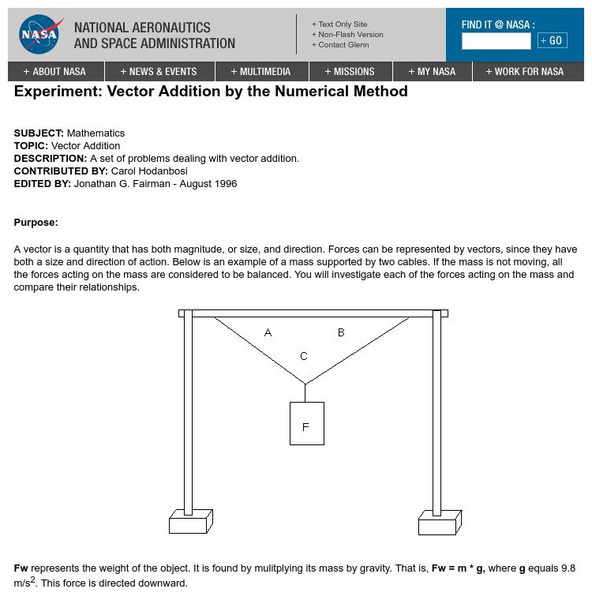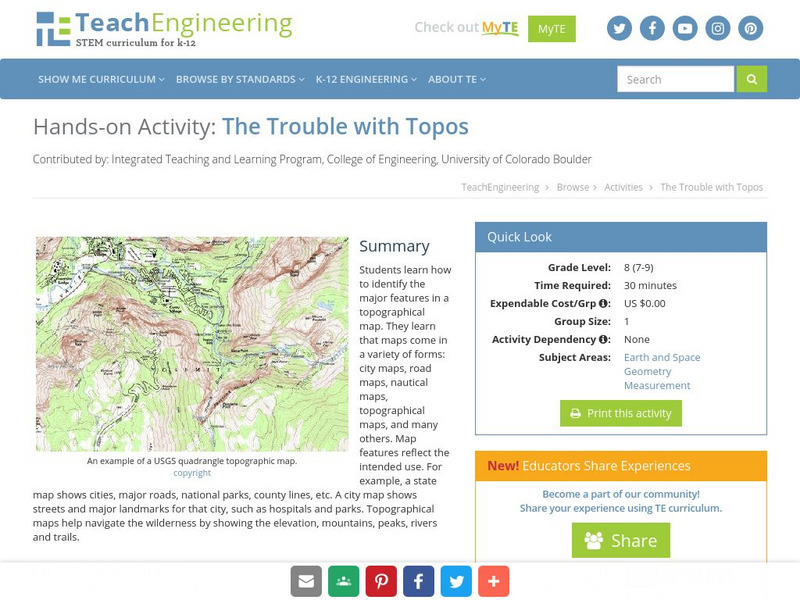Science Education Resource Center at Carleton College
Serc: Using Velocity and Acceleration Vectors to Interpret the Motion of a Car
Students understand that vectors have both magnitude and direction components as they investigate velocity and acceleration vectors.
Science Education Resource Center at Carleton College
Serc: Investigating Motion: Paths of a Marble
In this activity, children will investigate the paths that marbles take once set into motion and then how to change those paths, noting if and how they change.
wikiHow
Wiki How: How to Get Longitude and Latitude From Google Maps
This article will teach you how to get longitude and latitude for any given location using Google Maps.
Online Learning Haven
Finding Your Way: How to Read a Compass
A great explanation on what a compass is and how to read one. After the explanation, a step-by-step guide to drawing your own compass is given.
Other
Propagation of Light Using Geometry
A discussion of Christian Huygens' contribution to wave optics, and particularly to our understanding of the reflection and refraction of light. Excellent diagrams and a geometric proof on why the law of reflection is mathematically...
Other
Scientific Visualization: Vector Calculation
A Java applet on vector addition. Users drag two or more vectors to be added together. Clicking a button shows the resultant of the vectors.
NASA
Nasa: Vector Addition by the Numerical Method
A lab experiment involving readily available materials. Students analyze three forces acting upon one point to determine the resultant force. Questions and accompanying answers are provided.
Other
University of Arkansas: Simple Machines
A thorough discussion of all the simple machines, beginning with some thoughts on mechanical advantage and conservation of energy. Very complete. Move down to the section that interests you.
Other
Map Zone: Compasses and Directions
Sharpen map skills by exploring these map pages. Learn about the compass rose, different norths, and how to use a compass.
TeachEngineering
Teach Engineering: The Trouble With Topos
Students learn how to identify the major features in a topographical map. They learn that maps come in a variety of forms: city maps, road maps, nautical maps, topographical maps, and many others. Map features reflect the intended use....
TeachEngineering
Teach Engineering: Topos, Compasses, and Triangles, Oh My!
In this activity, students will learn how to actually triangulate using a compass, topographical (topo) map and view of outside landmarks. It is best if a field trip to another location away from school is selected. The location should...
CK-12 Foundation
Ck 12: Earth Science: Direction on the Earth
[Free Registration/Login may be required to access all resource tools.] Using latitude and longitude to find a location.
CK-12 Foundation
Ck 12: Plix: Graphical Methods of Vector Addition: Direction
[Free Registration/Login Required] Follow the path depicted on the map then try to convert the series of six steps to a set of written directions.
CK-12 Foundation
Ck 12: Physical Science: Direction
[Free Registration/Login may be required to access all resource tools.] Explores direction and why it is important, direction as a component of motion, and how to represent direction and distance with vectors.
CK-12 Foundation
Ck 12: Earth Science: Elevation on the Earth
[Free Registration/Login may be required to access all resource tools.] Using latitude and longitude to find a location.
Utah Education Network
Uen: Lesson Plan: Map the Path in My Father's Dragon
Lesson that helps students understand map concepts. After listening to the teacher read aloud each chapter of My Father's Dragon by Ruth Stiles Gannett, students discuss the book and use a map and general direction terms to describe the...
Sophia Learning
Sophia: Distance & Displacement
A video tutorial and slide show lesson explains the similarities and differences between distance and displacement. [3:11]
Sophia Learning
Sophia: Speed & Velocity
A slide show with three accompanying video lesson segments illustrating the difference between speed and velocity, and demonstrating how to calculate average speed and velocity. [6:31]
Northeast Parallel Architectures Center, Syracuse University
Npac Reu Program: Graphing With Coordinates in the Plane
This site from the Northeast Parallel Architectures Center, Syracuse University provides a good five-part basic graphing instructor. Covers all the basics clearly. It is divided into links for easier navigation.
Physics Classroom
The Physics Classroom: Newton's Laws: Drawing Free Body Diagrams
Students practice reading situations where forces are acting upon objects in all directions and magnitudes, and then draw free-body diagrams to represent the forces. Each problem has a self-checking key linked right on the page.
Physics Classroom
The Physics Classroom: Circular, Satellite, Rotational: Uniform Circular Motion
Uniform circular motion can be described as the motion of an object in a circle at a constant speed. This animation depicts this by means of a vector arrow.
Physics Aviary
Physics Aviary: Resultant Vector
A program that will randomly generate three sequential motions. You must determine the resultant vector's magnitude and direction.
Physics Aviary
Physics Aviary: Practice Problems: Net Force Difficult
A random problem dealing with three random forces. Must find the net force of the three forces.
Physics Aviary
Physics Aviary: Practice Problems: Drone Delivery Problem
Students must determine where a drone should be when it releases its package so that the object lands on the target.


















